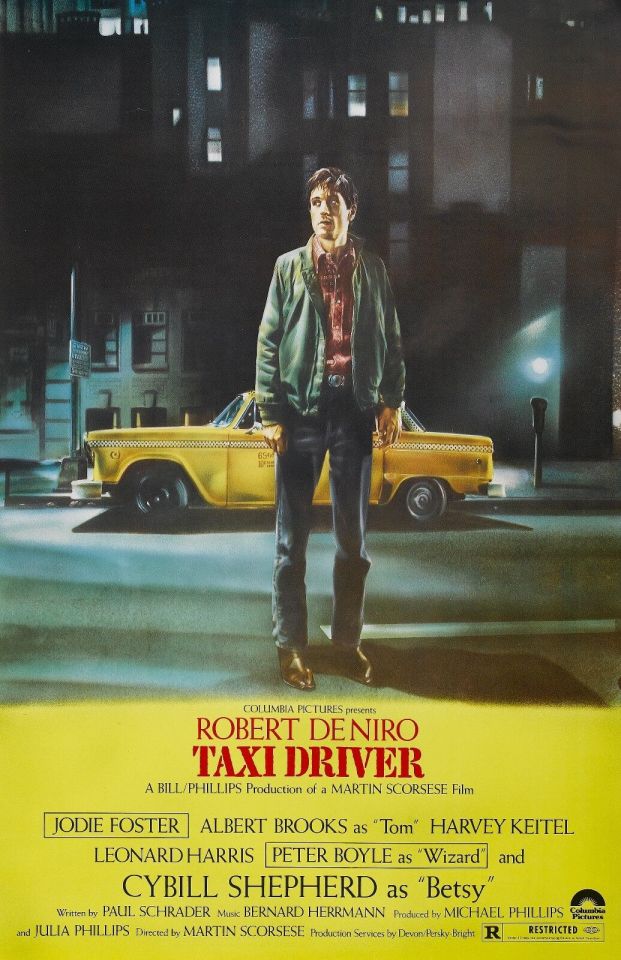#PreUberProblems
Text
TAXI DRIVER (1976)

Taxi Driver (1976): Where De Niro Goes Psycho in a Filthy Paradise
Strap in, cinephiles, for a dive into the grimy underbelly of 1970s New York with Martin Scorsese's neo-noir masterpiece, Taxi Driver (1976). Buckle up, this ain't your grandma's road trip.
Plot twist: This ain't your typical noir detective. Meet Travis Bickle (De Niro, channeling his inner psycho like a boss), a Vietnam vet and insomniac extraordinaire who navigates the city's moral abyss as a cabbie. Think neon lights, seedy characters, and enough urban grime to make a sanitation worker cry. As Travis spirals deeper into sleep deprivation and existential angst, the line between vigilante justice and, well, just plain crazy starts to blur faster than a disco dancer doing the hustle.
Genre bender alert! While Taxi Driver checks the neo-noir boxes (think shadows, femme fatales, and morally ambiguous choices), it throws in a healthy dose of psychological thriller, making you question Travis' sanity along with his cab fare sanity. Don't expect a clear-cut good guy vs. bad guy fight. Here, the darkness lurks within, and it ain't afraid to party.
De Niro's performance? Forget five stars, give him the whole Milky Way. The man embodies Travis' descent into madness with chilling brilliance. You see the sleep deprivation etch itself onto his face, hear the paranoia drip from his words, and witness the simmering rage finally boil over. It's a masterclass in acting, leaving you both terrified and oddly sympathetic.
The cinematography? More like grime-atography. Scorsese paints a portrait of New York City as a living, breathing organism, pulsating with neon fever and moral decay. The gritty close-ups, the claustrophobic car interiors, and the dizzying nighttime streetscapes all serve to amplify Travis' psychological turmoil. It's like watching a fever dream come to life, and honestly, it's kind of beautiful in its own twisted way.
Sound and music? Buckle up for an aural assault (in the best way possible). Bernard Herrmann's iconic score is a symphony of saxophones and brooding strings, perfectly capturing the film's unsettling atmosphere. The dialogue crackles with tension, and the sound effects - from screeching brakes to muffled gunshots - plunge you deeper into Travis' chaotic world.
Themes? Think alienation, violence, and the thin line between sanity and madness. Taxi Driver doesn't shy away from exploring the dark side of humanity, questioning the impact of societal decay and the potential for redemption. It's a film that stays with you long after the credits roll, making you ponder your own place in this crazy, mixed-up world.
My verdict? Four out of five stars. This film is a cult classic for a reason. It's not for the faint of heart, but if you're looking for a cinematic experience that punches you in the gut and lingers in your mind, Taxi Driver is your ride.
Bonus trivia: Did you know Robert De Niro actually drove a cab for a month to prepare for the role? Talk about method acting! Also, the film had a budget of $1.9 million and raked in a cool $28.6 million at the box office. Now that's what I call a profitable descent into madness.
So, hop in Travis' cab, but be warned, the destination might be darker than you expect. Enjoy (or don't)?
#movie#drama#psychology#thriller#neo-noir#taxi driver 1976#TaxiDriver#DeNiroIsAFreak#MeanStreetsMeetPsycho#HonkIfYoureInsane#NYCAfterDark#GrimeAndGlory#PreUberProblems#DialMForMurderTaxi#HesNotYourAverageJoe#SoMuchSaxophone#SlowBurnButWorthIt#CultClassicAlert#TriviaTime#BoxOfficeGold#DriverByDayDemonByNight
1 note
·
View note